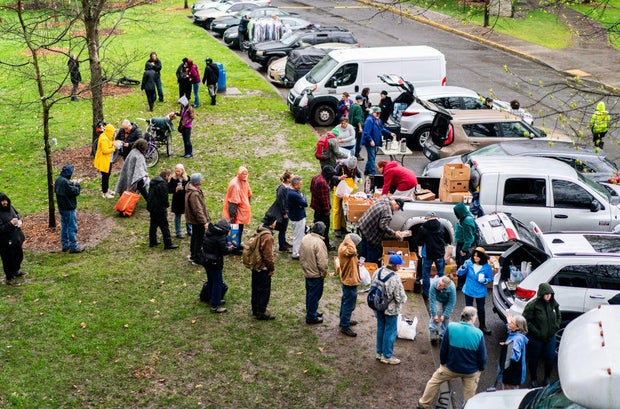Washington — The Supreme Court on Friday sided with a small Oregon town that imposes civil punishments on homeless people for sleeping in public spaces, finding that enforcement of its anti-camping rules is not prohibited by the Eighth Amendment’s protections from cruel and unusual punishment.
The 6-3 decision from the court in the case known as City of Grants Pass v. Johnson is its most significant involving homelessness in decades. It comes as cities nationwide grapple with a spike in the number of people without access to shelter, driven in part by high housing costs and the end of aid programs launched in response to the COVID-19 pandemic.
The ruling is likely to clear the way for state and local officials to mete out civil punishments in an effort to curtail homeless encampments, which have spread throughout the West as a result of a federal appeals court decision in the case involving anti-camping ordinances from Grants Pass, Oregon.
A number of state and local leaders across party lines have defended camping bans as necessary for protecting public health and safety, but the U.S. Court of Appeals for the 9th Circuit found laws imposing civil penalties on homeless people for sleeping outside when they have nowhere else to go are unconstitutional.
The Supreme Court reversed that decision, concluding that the enforcement of laws regulating camping on public property does not constitute cruel and unusual punishment under the Eighth Amendment.
The fight in Grants Pass
Homelessness rose 12% nationwide from 2022 to 2023, according to the Department of Housing and Urban Development, and on any given night last year, there were an estimated 256,000 unsheltered people in the U.S.
In Grants Pass, a city of roughly 40,000 located in southern Oregon, there are an estimated 600 homeless people. In 2013, local officials decided to ramp up enforcement of ordinances that prohibit sleeping or camping on public property or in city parks.
Violators face fines starting at $295, and repeat offenders may be banned from a city park for 30 days. If a person violates that order by camping in a park, they are subject to criminal trespass charges, punishable by up to 30 days in jail and a $1,250 fine. According to the city, more than 500 citations were issued from 2013 to 2018 for violations of the anti-camping ordinances.
In 2018, three homeless people in Grants Pass filed a lawsuit against the city on behalf of its homeless population, alleging that its rules violate the Eighth Amendment’s prohibition on cruel and unusual punishment.
The challengers prevailed before a federal district court, which blocked Grants Pass from enforcing its public camping ban during nighttime hours, and during the daytime unless it gave 24 hours notice.
A divided panel of three judges on the 9th Circuit upheld the district court’s decision, finding that Grants Pass couldn’t enforce its anti-camping ordinances against homeless people merely for sleeping outside with protection from the elements when they have nowhere else in the city to go. A full slate of 9th Circuit judges declined to rehear the case.
The Supreme Court heard arguments in April. The justices seemed to acknowledge the challenges with how best to address homelessness, but several suggested that those decisions were better left to policymakers, not judges.
The case attracted input from a range of advocacy groups, local and state officials, law enforcement groups and the federal government.
Leaders of major cities like Phoenix and Los Angeles, as well as the state of California, warned against limiting their ability to respond to homeless people sleeping in public areas, including by clearing encampments or enforcing their rules against public camping.

